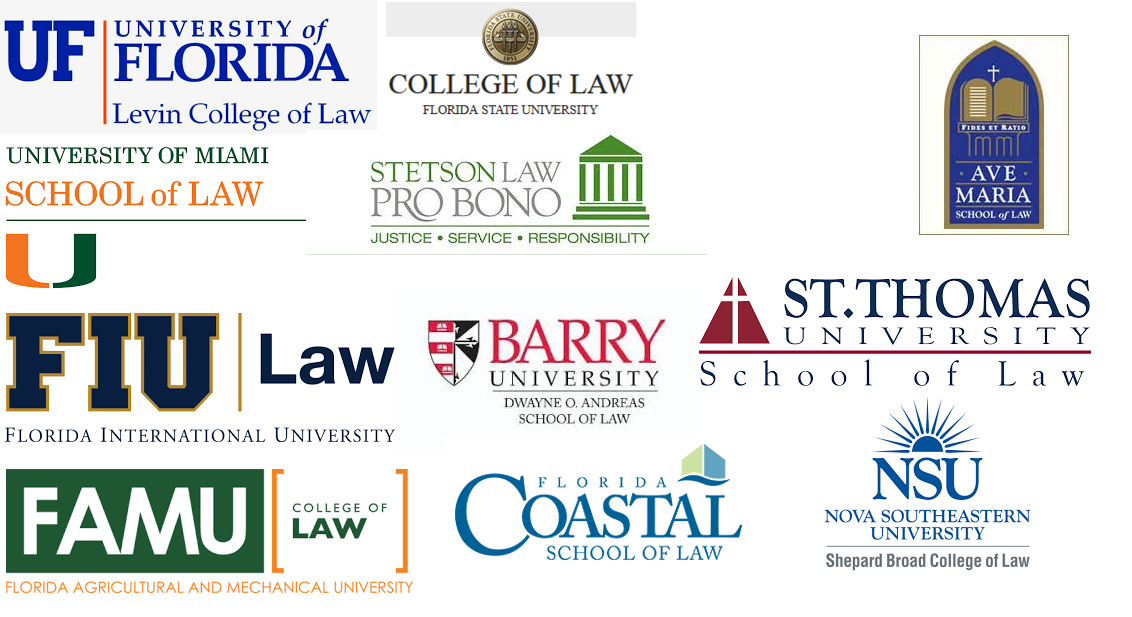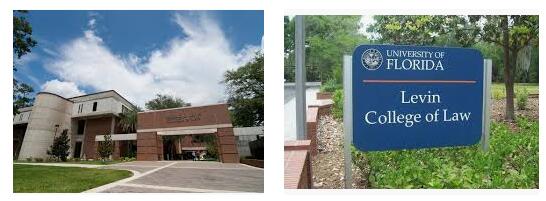Are you pursing a law degree? The TopSchoolsintheUSA.com has generated the latest ranking of best law schools in Florida that provides Master of Legal Studies (MLS), Master of Dispute Resolution (MDR), Juris Doctor (JD), Master of Laws (LLM), or Doctor of Juridical Science (SJD). You can use the following list to pick a school that fits your needs. These law schools in Florida are ranked based on the student reviews, alumni surveys, assessment of peer institutions, and official data reported by each law college. In addition, we also provide average LSAT scores, GPA and acceptance rates for each of these law schools in Florida.
Top ABA-Approved Law Schools in Florida
| National Ranking | Best Law Programs |
| 48 | University of Florida (Levin) (Gainesville, FL) Acceptance rate: 28.9% LSAT scores (25th-75th percentile): 160-164 GPA (25th-75th percentile): 3.43-3.82 Tuition & Fees: In-state, full-time: $18,710 per year, Out-of-state, full-time: $38,075 per year Enrollment (full-time): 976 Graduates known to be employed nine months after graduation: 85.4%
|
| 52 | Florida State University (Tallahassee, FL) Acceptance rate: 27.0% LSAT scores (25th-75th percentile): 160-163 GPA (25th-75th percentile): 3.18-3.68 Tuition & Fees: In-state, full-time: $18,343 per year, Out-of-state, full-time: $37,905 per year Enrollment (full-time): 729 Graduates known to be employed nine months after graduation: 91.4%
|
| 72 | University of Miami (Coral Gables, FL) Acceptance rate: 47.0% LSAT scores (25th-75th percentile): 156-160 GPA (25th-75th percentile): 3.19-3.57 Tuition & Fees: Full-time: $39,848 per year Enrollment (full-time): 1,290 Graduates known to be employed nine months after graduation: 83.5%
|
| 115 | Florida International University (Miami, FL) Acceptance rate: 20.5% LSAT scores (25th-75th percentile): 152-157 GPA (25th-75th percentile): 3.22-3.77 Tuition & Fees: In-state, full-time: $16,585 per year, Out-of-state, full-time: $30,370 per year Enrollment (full-time): 369 Graduates known to be employed nine months after graduation: 90.1%
|
| 121 | Stetson University (Gulfport, FL) Acceptance rate: 37.9% LSAT scores (25th-75th percentile): 153-157 GPA (25th-75th percentile): 3.11-3.57 Tuition & Fees: Full-time: $35,466 per year Enrollment (full-time): 855 Graduates known to be employed nine months after graduation: 78.3%
|
| 148 | Ave Maria School of Law (Naples, FL) Acceptance rate: 53.8% LSAT scores (25th-75th percentile): 146-153 GPA (25th-75th percentile): 2.79-3.48 Tuition & Fees: Full-time: $36,448 per year Enrollment (full-time): 489 Graduates known to be employed nine months after graduation: 65.5%
|
| 149 | Barry University (Orlando, FL) Acceptance rate: 58.0% LSAT scores (25th-75th percentile): 147-152 GPA (25th-75th percentile): 2.55-3.26 Tuition & Fees: Full-time: $33,630 per year Enrollment (full-time): 528 Graduates known to be employed nine months after graduation: 60.4%
|
| 158 | Florida A&M University (Orlando, FL) Acceptance rate: 40.8% LSAT scores (25th-75th percentile): 145-151 GPA (25th-75th percentile): 2.81-3.34 Tuition & Fees: In-state, full-time: $12,424 per year, Out-of-state, full-time: $32,327 per year Enrollment (full-time): 509 Graduates known to be employed nine months after graduation: 55.6%
|
| 159 | Florida Coastal School of Law (Jacksonville, FL) Acceptance rate: 66.0% LSAT scores (25th-75th percentile): 145-151 GPA (25th-75th percentile): 2.83-3.34 Tuition & Fees: Full-time: $36,968 per year Enrollment (full-time): 1,702 Graduates known to be employed nine months after graduation: 79.7%
|
| 168 | Nova Southeastern University (Broad) (Fort Lauderdale, FL) Acceptance rate: 40.5% LSAT scores (25th-75th percentile): 148-152 GPA (25th-75th percentile): 2.98-3.43 Tuition & Fees: Full-time: $33,250 per year Enrollment (full-time): 855 Graduates known to be employed nine months after graduation: 79.2%
|
| 178 | St. Thomas University (Miami Gardens, FL) Acceptance rate: 46.0% LSAT scores (25th-75th percentile): 148-153 GPA (25th-75th percentile): 2.66-3.32 Tuition & Fees: Full-time: $34,618 per year Enrollment (full-time): 719 Graduates known to be employed nine months after graduation: 71.8%
|
All Law Schools in Florida
Florida is home to several prestigious law schools that offer students a wide variety of legal education programs, from traditional Juris Doctor (J.D.) degrees to specialized Master of Laws (LL.M.) programs. These law schools provide rigorous academic training, real-world legal experience, and strong connections to both local and national legal markets.
1. University of Florida Levin College of Law
Overview
The University of Florida Levin College of Law, located in Gainesville, is widely regarded as one of the top public law schools in the country. Established in 1909, it consistently ranks among the best law schools in Florida and is well-known for its high bar passage rates, large alumni network, and its expertise in tax law, environmental law, and business law.
Degree Programs
The Levin College of Law offers a range of degree programs tailored to different types of legal professionals:
- Juris Doctor (J.D.): A three-year program designed to prepare students for legal practice. It includes clinical programs, externships, and a comprehensive legal curriculum.
- LL.M. in Taxation: A specialized one-year program for students who want to focus on tax law.
- LL.M. in International Taxation: Designed for both U.S. and foreign-trained lawyers interested in cross-border tax issues.
- LL.M. in Environmental and Land Use Law: For students who want to specialize in environmental and land use legal practices.
- S.J.D. (Doctor of Juridical Science): A research-focused doctoral program for those interested in legal academia or advanced legal research.
Admission Requirements
Admission to the University of Florida Levin College of Law is highly competitive, with strong emphasis placed on LSAT scores, undergraduate GPA, and other application components.
- Average LSAT: 165
- Average GPA: 3.84
Additional components considered in the admissions process include:
- Personal Statement: Applicants must submit a personal statement outlining their interest in law, career goals, and what they can contribute to the law school community.
- Letters of Recommendation: Typically from academic or professional references who can attest to the applicant’s qualifications.
- Resume: Highlighting academic achievements, internships, work experience, and leadership roles.
Starting Salaries
Graduates of the Levin College of Law often secure high-paying jobs, especially in top law firms, corporations, and government agencies.
- Median starting salary (private sector): $105,000
- Median starting salary (public sector): $65,000
2. Florida State University College of Law
Overview
The Florida State University College of Law, located in Tallahassee, is one of the top-ranked public law schools in the Southeast. Known for its strong focus on public service, business law, and international law, FSU Law has a prime location near the Florida Capitol, offering students ample opportunities to engage in internships and externships with state agencies and the legislature.
Degree Programs
FSU Law provides several degree programs that prepare students for successful legal careers:
- Juris Doctor (J.D.): A full-time program that emphasizes both theoretical understanding and practical experience. Students can specialize in various areas of law, such as international law, business law, and criminal law.
- LL.M. in Business Law: Designed for both U.S. and international students who want to specialize in business and corporate law.
- LL.M. in American Law for Foreign Lawyers: A program that introduces foreign-trained lawyers to the American legal system.
- J.D./M.B.A.: A joint degree program offered in collaboration with FSU’s College of Business.
- J.D./M.S. in International Affairs: A dual degree that prepares students for careers in international law and policy.
Admission Requirements
FSU Law has a competitive admissions process that evaluates candidates based on their academic performance, standardized test scores, and personal achievements.
- Average LSAT: 160
- Average GPA: 3.68
Other factors that influence admissions include:
- Personal Statement: Applicants must provide a clear explanation of their reasons for pursuing a legal education and how FSU Law fits into their career goals.
- Letters of Recommendation: At least two letters are required, preferably from academic sources or employers.
- Resume: Outlining the applicant’s work experience, internships, and community involvement.
Starting Salaries
Graduates of FSU Law enjoy competitive starting salaries, particularly for those working in the private sector or with government agencies in Florida.
- Median starting salary (private sector): $90,000
- Median starting salary (public sector): $55,000
3. University of Miami School of Law
Overview
The University of Miami School of Law, located in Coral Gables, is one of Florida’s top private law schools, known for its diverse curriculum, international focus, and strong programs in entertainment law, maritime law, and international arbitration. Established in 1926, it has a strong reputation for producing practice-ready graduates with a global perspective.
Degree Programs
Miami Law offers a wide range of degree programs that cater to different legal interests and career goals:
- Juris Doctor (J.D.): The core three-year program, offering concentrations in areas like international law, environmental law, and entertainment law.
- LL.M. in International Arbitration: A specialized program for students interested in cross-border dispute resolution.
- LL.M. in Maritime Law: For students who want to focus on legal issues related to the maritime industry.
- LL.M. in Taxation: Designed for students who want to specialize in tax law.
- Dual Degree Programs: Miami Law offers several dual degrees, including:
- J.D./M.B.A. (Master of Business Administration)
- J.D./M.P.A. (Master of Public Administration)
- J.D./M.M. (Master of Music Industry)
Admission Requirements
Miami Law has a competitive admissions process, seeking candidates with strong academic backgrounds, leadership skills, and professional potential.
- Average LSAT: 159
- Average GPA: 3.45
Other application components include:
- Personal Statement: Applicants must explain their motivation for pursuing law and their specific interest in Miami Law.
- Letters of Recommendation: Typically from academic professors or employers who can speak to the applicant’s abilities.
- Resume: Highlighting leadership roles, work experience, and relevant extracurricular activities.
Starting Salaries
Miami Law graduates have a strong presence in Florida’s legal market and internationally, particularly in areas like entertainment, business, and maritime law.
- Median starting salary (private sector): $100,000
- Median starting salary (public sector): $60,000
4. Stetson University College of Law
Overview
Stetson University College of Law, located in Gulfport (near St. Petersburg), is the oldest law school in Florida. Founded in 1900, it has a long-standing reputation for excellence in advocacy, legal writing, and elder law. Stetson Law is particularly well-known for its trial advocacy and moot court programs, which consistently rank among the best in the country.
Degree Programs
Stetson Law offers a variety of programs that emphasize experiential learning and professional skills:
- Juris Doctor (J.D.): A comprehensive three-year program designed to prepare students for general legal practice.
- LL.M. in Advocacy: A specialized program focusing on trial advocacy and courtroom skills.
- LL.M. in Elder Law: Designed for students interested in representing elderly clients in areas like estate planning and elder abuse litigation.
- Dual Degree Programs:
- J.D./M.B.A. (Master of Business Administration)
Admission Requirements
Admission to Stetson Law is competitive, with the school seeking candidates who demonstrate strong academic performance, leadership potential, and an interest in advocacy.
- Average LSAT: 156
- Average GPA: 3.32
The admissions process also includes:
- Personal Statement: A narrative that explains the applicant’s interest in law, why they chose Stetson, and their career aspirations.
- Letters of Recommendation: From individuals who can provide insight into the applicant’s academic and professional qualifications.
- Resume: Detailing work experience, internships, leadership roles, and community involvement.
Starting Salaries
Stetson Law graduates are well-prepared for careers in litigation, elder law, and criminal justice, with many working in law firms and government agencies.
- Median starting salary (private sector): $80,000
- Median starting salary (public sector): $55,000
5. Florida International University College of Law (FIU Law)
Overview
FIU Law, located in Miami, is one of Florida’s newer law schools, established in 2000. Despite its relatively young age, it has quickly gained a reputation for excellence, particularly in terms of its high bar passage rates and affordable tuition. FIU Law is known for its diverse student body and strong emphasis on public service and international law.
Degree Programs
FIU Law offers a variety of degree programs aimed at providing students with a solid legal foundation and practical experience:
- Juris Doctor (J.D.): A three-year program that offers specializations in international law, immigration law, and public interest law.
- LL.M. in U.S. Law: For foreign-trained lawyers who want to gain knowledge of the U.S. legal system and practice in the U.S.
- Joint Degrees:
- J.D./M.B.A. (Master of Business Administration)
- J.D./M.P.H. (Master of Public Health)
Admission Requirements
FIU Law has a competitive admissions process, seeking students with strong academic backgrounds and a commitment to public service.
- Average LSAT: 157
- Average GPA: 3.53
Other components of the application process include:
- Personal Statement: Describing the applicant’s background, interest in FIU Law, and career goals.
- Letters of Recommendation: From professors or employers who can speak to the applicant’s abilities.
- Resume: Highlighting leadership roles, work experience, and community service.
Starting Salaries
FIU Law graduates have strong job prospects, particularly in South Florida, where they work in law firms, government, and public interest organizations.
- Median starting salary (private sector): $85,000
- Median starting salary (public sector): $58,000











